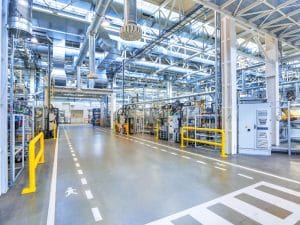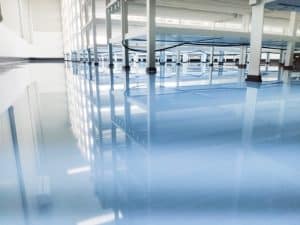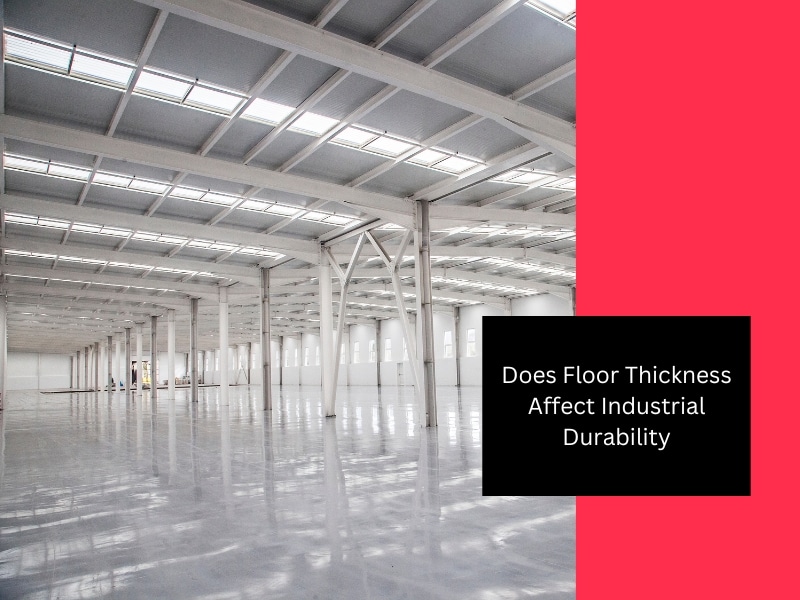When it comes to industrial flooring, the thickness of the floor can have a significant impact on its durability and performance. Whether you’re working with heavy machinery, handling chemicals, or ensuring safety, the right flooring system is essential. But does floor thickness really make a difference in how well your floor holds up over time? This article will explore the relationship between floor thickness and industrial durability, particularly focusing on epoxy flooring.
Why is floor thickness important for industrial durability?
The thickness of your industrial flooring plays a crucial role in its overall durability. Thicker floors tend to offer greater protection, longevity, and resistance to wear and tear. Here are a few key points to consider:
- Increased load-bearing capacity: Thicker floors can support heavier loads, reducing the risk of cracking or breaking under pressure.
- Better impact resistance: Thicker Floors are better at absorbing impacts, making them ideal for high-traffic environments and areas with heavy equipment.
- Enhanced protection against chemicals: Thicker coatings provide an extra layer of protection against harsh chemicals, reducing the likelihood of surface damage or contamination.
- Longer lifespan: Thicker floors typically last longer, as they are more resistant to the stresses placed on them over time.
How does epoxy flooring benefit from increased thickness?
Epoxy flooring, when applied as a thicker coating, provides enhanced durability and strength. Below are some ways in which the thickness of an epoxy floor can improve its performance:
- Improved wear resistance: A thicker epoxy layer increases resistance to scratches, abrasions, and wear from foot traffic and machinery.
- Enhanced chemical resistance: Thicker coatings offer greater protection against harsh chemicals, preventing damage.
- Better slip resistance: Extra anti-slip elements improve safety, especially in high-risk industrial environments.
- Seamless finish: Thicker layers create a smoother, more uniform surface, reducing the likelihood of uneven wear over time.
What are the key factors influencing floor thickness in industrial applications?
In industrial settings, several factors influence the required thickness of flooring. These include:
- Type of industry: The demands of each industry dictate the thickness required. For example, a food handling facility may need a floor thickness different from that of a heavy machinery workshop.
- Traffic volume: High-traffic areas with constant foot or vehicle movement require thicker floors to handle the wear.
- Exposure to chemicals or heavy machinery: If the floor is exposed to corrosive chemicals or heavy machinery, a thicker floor will provide better protection and durability.
- Temperature variations: Extreme temperature fluctuations can cause the flooring to expand or contract, so thicker floors may be needed to maintain stability.

To achieve the best results, it’s worth taking the time to explore epoxy flooring for different surfaces, ensuring compatibility and durability.
How does floor thickness affect the maintenance and longevity of industrial flooring?
One of the primary reasons to opt for thicker industrial flooring is its impact on maintenance and longevity. Here’s how thickness can make a difference:
- Lower maintenance costs: Thicker floors are more durable, meaning they won’t need repairs or replacements as frequently.
- Resistance to cracks and damage: A thicker coating makes floors less prone to cracking or chipping, even under constant stress.
- Extended lifespan: The durability provided by extra thickness ensures that the floor remains in top condition for a longer period, reducing the need for early replacements.
When selecting flooring for industrial applications, it’s important to ensure compliance with Australian Standards for Building Structures to maintain safety and structural integrity.
Can thicker floors handle more stress and heavy machinery?
Absolutely. Thicker floors are specifically designed to handle the added stress from heavy machinery and equipment. Here’s how they perform under pressure:
- Improved load distribution: Thicker floors help distribute the weight of heavy machinery more evenly, reducing the likelihood of pressure points that could lead to damage.
- Resistant to indentations: Floors that are too thin may get indented or damaged under the weight of machinery. Thicker floors can withstand these pressures without suffering long-term damage.
- Enhanced durability: The increased thickness helps floors withstand the daily stresses of industrial environments, ensuring that they remain in good condition for a longer time.
For industries that deal with heavy machinery, the best epoxy flooring for industrial applications offers the strength and durability needed to withstand constant stress.
Is thicker flooring the right choice for every industry?
While thicker flooring offers numerous advantages, it’s not always necessary for every industrial application. When selecting flooring solutions, it’s crucial to choose the right epoxy floor for your business to ensure optimal performance and longevity. Here’s how to determine if it’s the right choice for your business:
- Nature of the industry: Industries such as food processing, pharmaceuticals, and laboratories often require thicker flooring for better protection against chemicals and bacteria. However, some industries may not need such a robust system.
- Budget considerations: Thicker flooring systems tend to be more expensive, so it’s essential to evaluate whether the added durability justifies the additional cost.
- Space requirements: If the space in question has tight clearances, it may not be feasible to install a thicker floor. However, for expansive areas like warehouses or workshops, thicker floors may be ideal.

What are the cost implications of thicker industrial floors?
Choosing a thicker floor coating often comes with a higher upfront cost. However, the long-term benefits can outweigh the initial investment:
- Higher installation costs: The materials and labour required to install thicker floors tend to cost more.
- Long-term savings: Although the initial cost is higher, thicker floors typically reduce maintenance and replacement costs, leading to overall savings in the long run.
- Improved ROI: For industries where downtime and repairs are costly, investing in thicker flooring can provide a high return on investment by reducing interruptions and increasing the lifespan of the floor.
Get the best in industrial epoxy flooring
If you’re looking for industrial epoxy flooring that offers exceptional durability, protection, and performance, look no further than Ultimate Epoxy Floors. With years of experience in providing epoxy, polyurethane, and polyaspartic flooring systems, we ensure that every installation is done with precision and expertise.
Our team is dedicated to providing tailored solutions that meet your specific needs. Whether you need epoxy floors for a warehouse, food handling facility, or workshop, we can customise the perfect solution. We offer high-quality, slip-resistant, and chemical-resistant floors that last for years, giving you peace of mind and value for money.
Ready to transform your industrial space with the best flooring solutions? Contact Ultimate Epoxy Floors today for a consultation!







